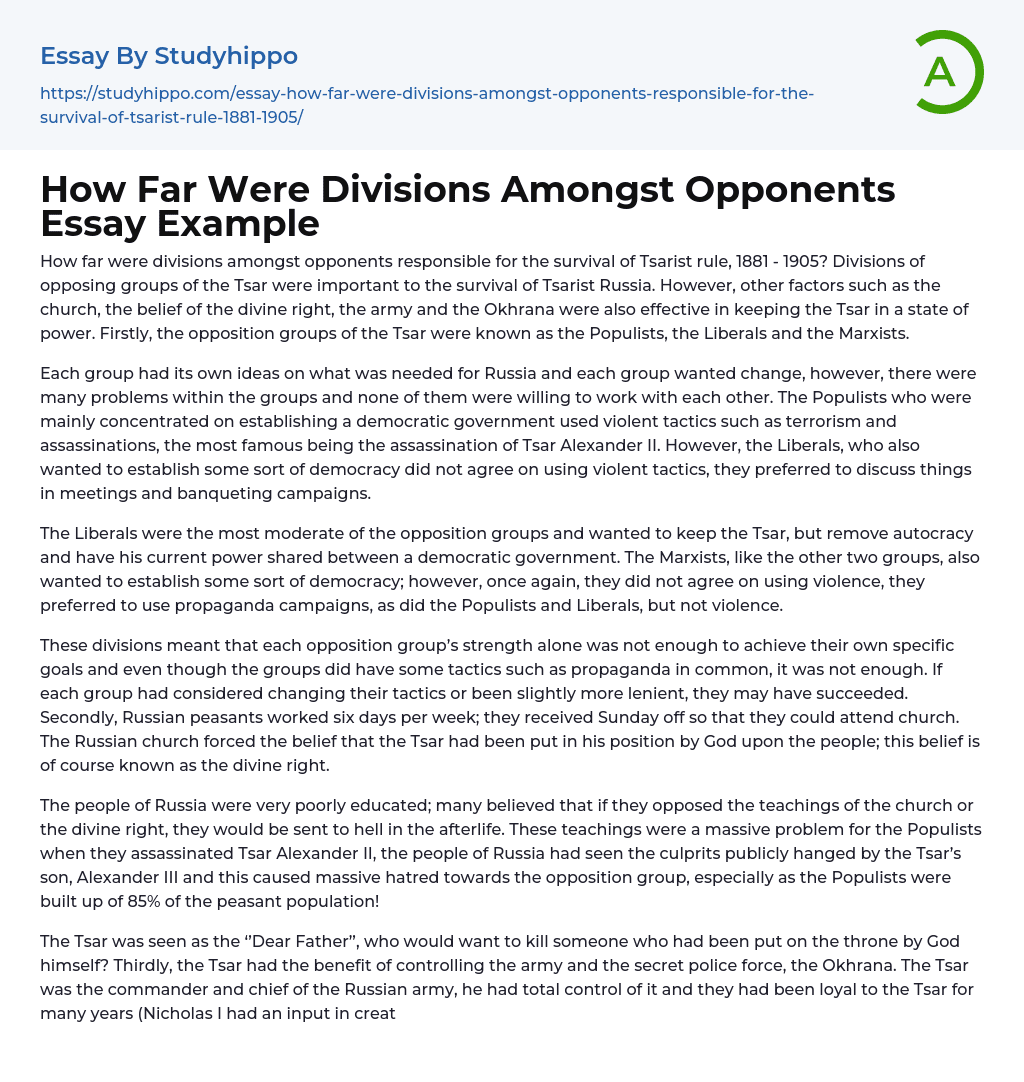What role did the internal disagreements among opposition factions play in maintaining Tsarist rule from 1881 to 1905? The inner strife within groups opposed to the Tsar significantly aided in perpetuating the existence of Tsarist Russia. Nonetheless, other factors such as the sway of the church, belief in divine right, military support and Okhrana equally contributed to upholding the power of the Tsar. These opposing elements were typically recognized as Populists, Liberals or Marxists.
Each cluster had differing concepts regarding Russia's needs and were keen on bringing about a change, but they faced numerous internal issues and a lack of willingness to cooperate with each other. The Populists, who primarily aimed to set up a democratic government, resorted to brutal techniques like terrorism and assassinations, with the most notable one being the killing of Tsar Alexander II. On the contrary, the Lib
...erals, who were also interested in setting up a democratic system, disagreed with the use of hostile methods and opted for discussions in gatherings and banquet campaigns instead.
The opposition viewed the Liberals as somewhat moderate, with their goals being to maintain the Tsar's status while deconstructing autocracy and transferring his powers to a democratic institution. Likewise, Marxists and Populists endeavored to create a democratic governance system. Although they shared these objectives, they diverged in their plans of action - choosing propaganda activities over violent approaches, an approach that received equal backing from both Liberals and Populists.
The fragmentation among the opposition groups rendered their individual abilities insufficient to attain their unique objectives. Despite employing common strategies like propaganda, it did not suffice. They could have achieved success if
they had contemplated on modifying their approaches or exhibiting a bit more flexibility. Furthermore, the Russian peasants labored for six days a week, with only Sunday off to go to church. The Russian church propagated the concept that God had ordained the Tsar's reign, a belief synonymous with the divine right.
The Russian populace was highly uneducated, with many holding the notion that voicing opposition towards the doctrine of the church or the divine authority would result in their condemnation to hell after death. This belief posed a significant hurdle for the Populists, who faced serious backlash after their successful plot to murder Tsar Alexander II. The execution of the conspirators by Alexander III, witnessed publicly by their fellow countrymen, sparked intense loathing for this opposition group; quite notable considering that these Populists constituted 85% of the predominantly agrarian society!
Referred to as the "Dear Father", the Tsar was viewed as a divine-appointed leader, and thus, no one desired to inflict harm upon him. He held the unique advantage of exercising authority over both military forces and Okhrana, a secret police unit. Given his total control over Russian soldiers, their steadfast loyalty to him was guaranteed - a fact that has been repeatedly demonstrated. It's important to highlight that Nicholas I played a vital part in establishing Okhrana. The Tsars were recognized for their effective management of both the armed forces and Okhrana.
Resisting the Tsar with force or protest would prompt a severe response from the military, leaving many demonstrators wounded or crushed by horses. This forceful show eliminated active threats to the Tsar while discouraging potential opposition, as they became
clear on the grim consequences of their defiance towards the 'Dear father'. The Okhrana, infamous for its shrewd tactics, would penetrate resistance groups and exacerbate their internal discord. Captured members of such groups were doomed to live out their days in Siberia's harsh, cold environment, a grim punishment indeed.
Following the assassination of Tsar Alexander II by the Populists, his son, Alexander III took over the reins of Tsarist Russia. Displaying exceptional acumen, Alexander III skilfully employed language to convince Russians that his actions were for their benefit. In order to earn the trust and respect of his religious disciples who were unlikely to question what they perceived as 'God's will', he frequently invoked God in his speeches. Furthermore, Alexander III repealed all reforms implemented by his father and predecessor, consequently curtailing the liberties and rights of Russian citizens as well as their foreign affairs.
Despite Alexander II's progress, Russia regressed by another three steps. Ultimately, I contend that the key to the endurance of the Tsarist Russia was the Army and the Okhrana. Their influential actions immobilized opposing factions and intimidated others from opposing the Tsarist rule. Their strategic use of violence coupled with a standby military force of one million proved extremely successful in assuring the Tsar's secure reign, maintaining his adversaries in their current predicament.
- Baptism essays
- Holy Spirit essays
- Jesus Christ essays
- Adam And Eve essays
- Crucifixion Of Jesus essays
- Crusades essays
- Eucharist essays
- God The Father essays
- Pope essays
- Protestantism essays
- Christian essays
- Church essays
- Elizabeth essays
- Sacrament essays
- Catholic Church essays
- Lord essays
- Priest essays
- Protestant Reformation essays
- Business Law essays
- Contract essays
- Consumer Protection essays
- Property essays
- Ownership essays
- Agreement essays
- Common Law essays
- Contract Law essays
- Justice essays
- Security essays
- Tort Law essays
- United States Constitution essays
- Crime essays
- Lawsuit essays
- Treaty essays
- Family Law essays
- Marijuana Legalization essays
- Constitution essays
- War on Drugs essays
- Court essays
- Jury essays
- Police essays
- Protection essays
- Community Policing essays
- Criminal Law essays
- Judge essays
- Lawyer essays
- Employment Law essays
- Copyright Infringement essays
- Injustice essays
- Intellectual Property essays
- Breach Of Contract essays




